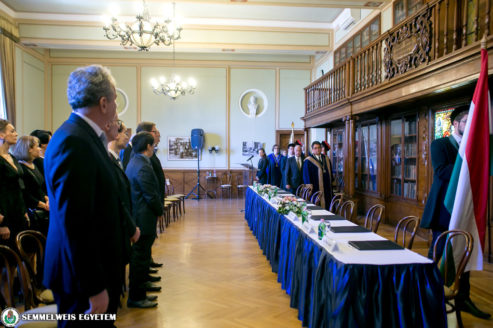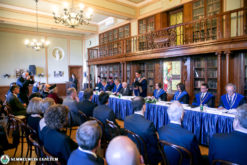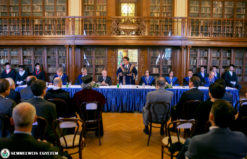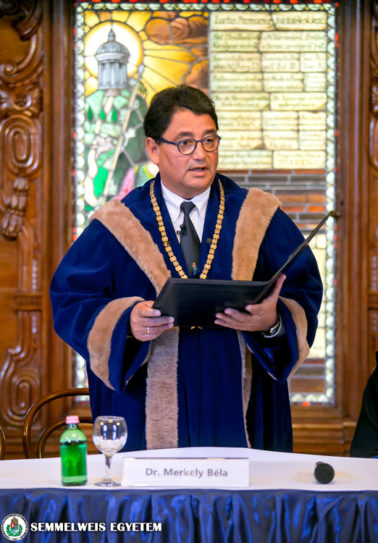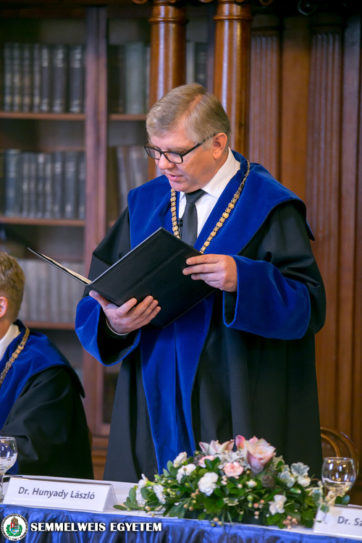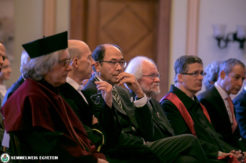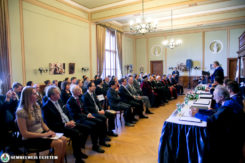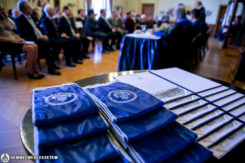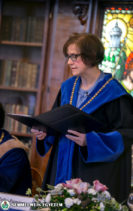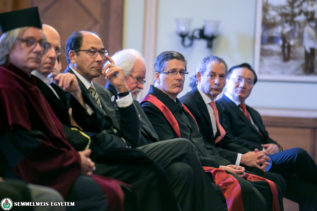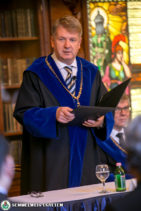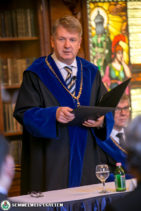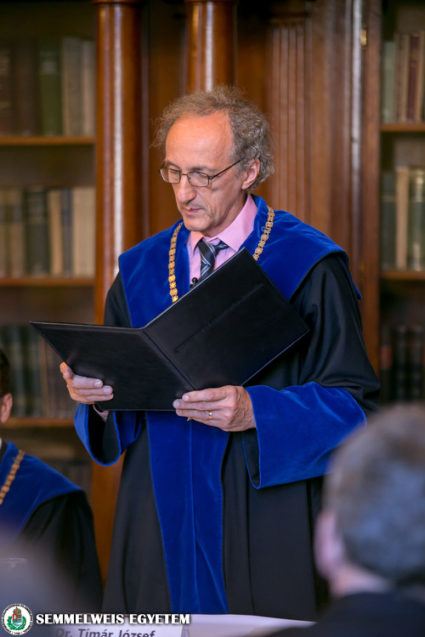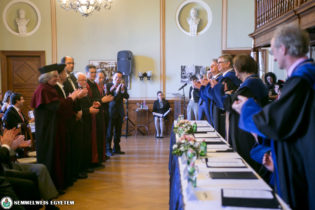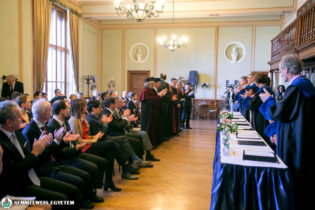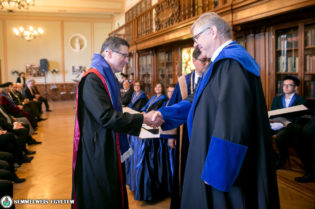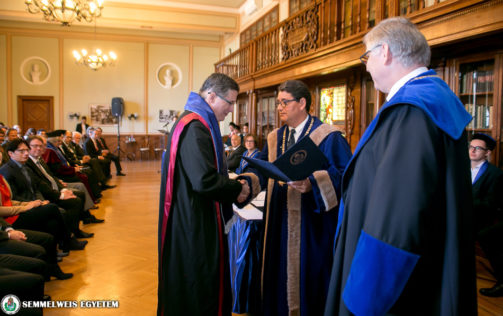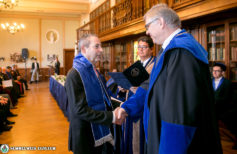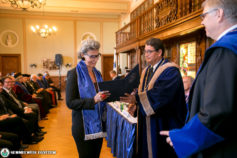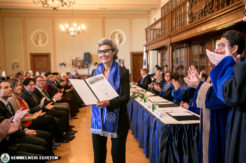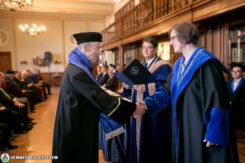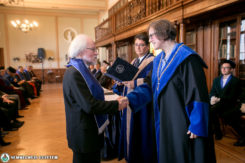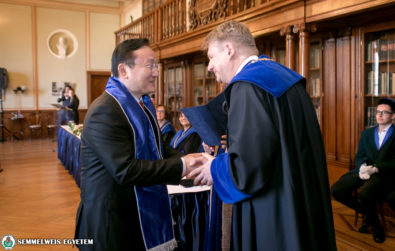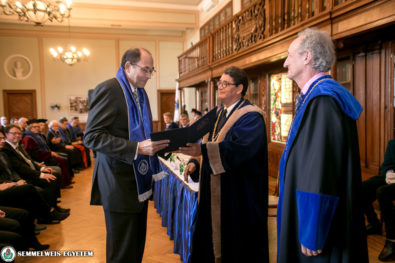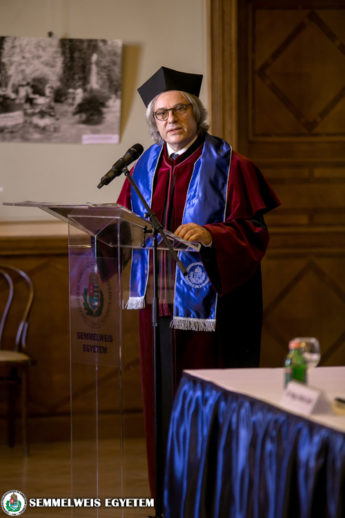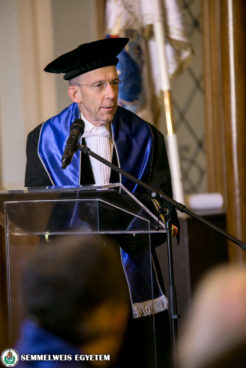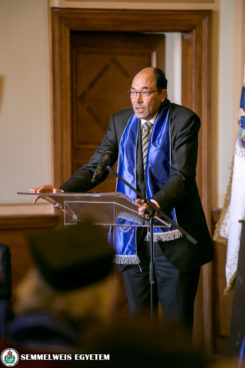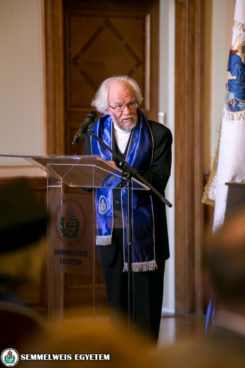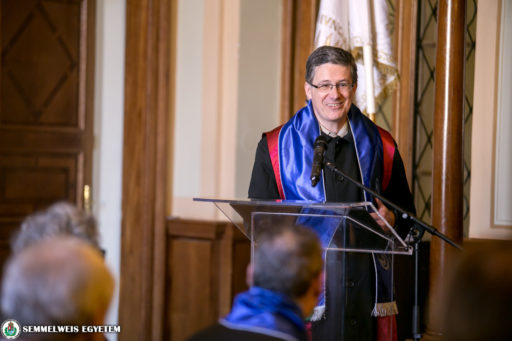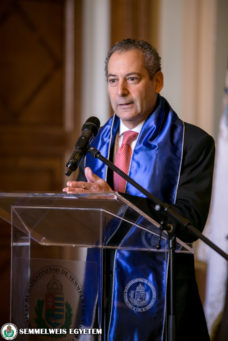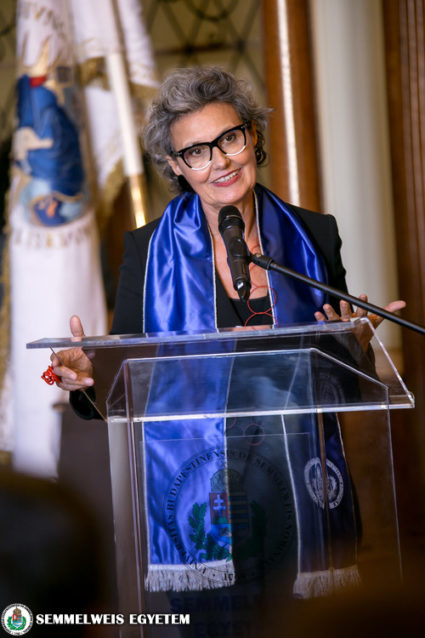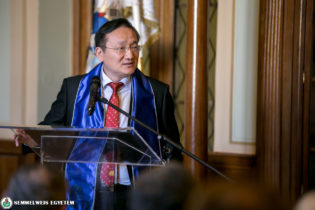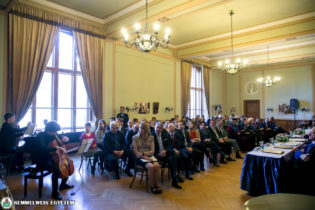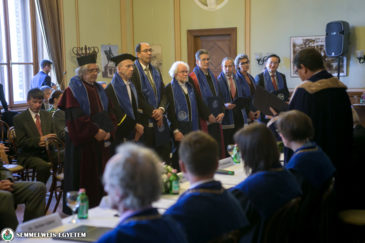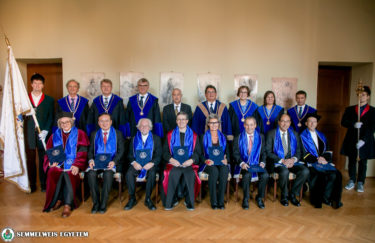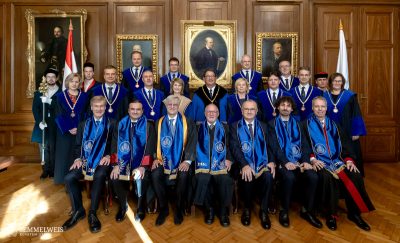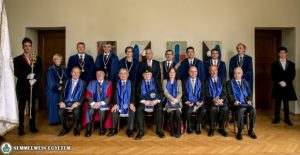Eight outstanding and internationally recognised professors were given Semmelweis University’s Doctor Honoris Causa award. The ceremony, which has been the 44th held in Semmelweis Salon since 1967, was opened by Dr. Béla Merkely, Rector.
This year the Faculty of Medicine nominated four professors for the awards and the laudations were presented by Dr. László Hunyady, Dean of the Faculty.
Dr. Piotr L. Chlosta is the chairman of the Department of Urology at the Jagiellonian University in Krakow and president of the Polish Urological Association. He was the first urologic surgeon to implant an artificial urinary sphincter in a male patient with laparoscopic technique. He introduced minimally invasive methods in the field of urological oncology and created a full-profile urological centre at the university in Krakow. In collaboration with Semmelweis University he has helped organise the Hungarian-Polish Scientific Assembly at the American Urological Association’s annual meetings in the USA since 2012. He is the author of several scientific papers and three internationally published books, one of which was written in collaboration with Semmelweis University’s Department of Urology.
Dr. Miklós Sahin-Tóth is a prominent, internationally recognised translational researcher with a specialisation in pancreatitis. Currently, he is the director of the Department of Exocrine Disorders at the University of Boston. He has made seminal discoveries in the characterisation of the pancreatic digestive enzymes and the genetic risk factors of chronic pancreatitis. He has been working in close collaboration with Semmelweis University’s Department of Medical Chemistry, Molecular Biology and Pathobiochemistry for over 15 years. He offered the possibility to 8 young reseachers from the University to work and study in his laboratory at the University of Boston. As a result of this cooperation, 30 papers have been jointly published with students and researchers from Semmelweis University.
Dr. Scott David Solomon is a world-famous cardiologist, professor at Harvard Medical School and The Edward D. Frohlich Distinguished Chair. His research interests are structural and functional changes following myocardial injury, decreasing the risk factors of patients suffering from chronic heart failure and cardiovascular safety of non-cardiovascular therapies. He was pioneering in the use of cardiac imaging to develop cardiovascular drugs and devices to utilize them in clinical trials. He has been in close collaboration with Semmelweis University’s Városmajor Heart and Vascular Centre for over a decade. 14 joint papers have been written on the pharmacological and non-pharmacological treatment of heart failure and the Centre has been involved in three of his groundbreaking clinical trials. 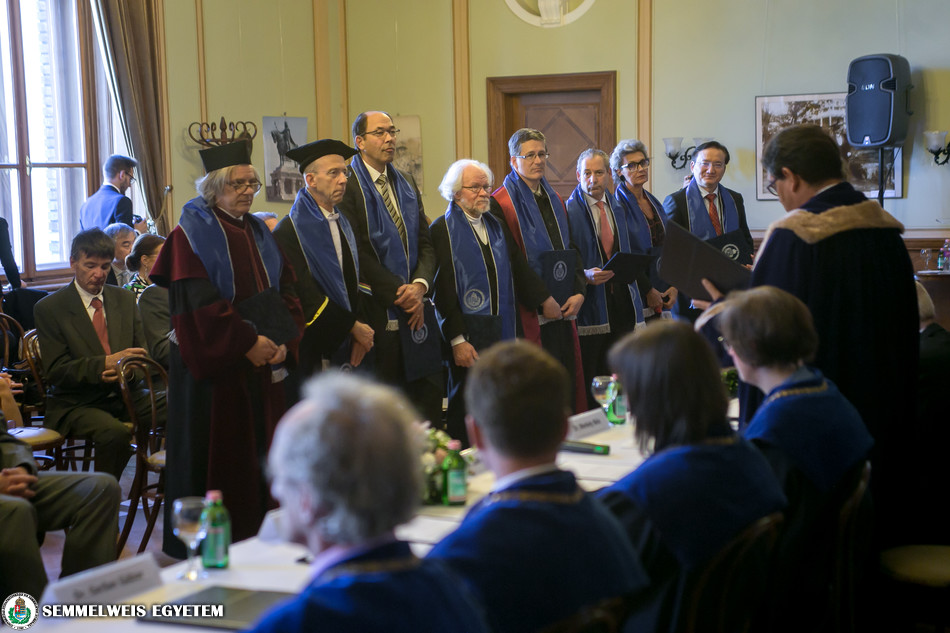
Dr. Maria Antonietta Stazi is a genetic epidemiologist at the Istituto Superiore di Sanitá in Rome, and the founder and director of the Italian Twin Registry. Her research focuses mainly on the genetic epidemiology of cardiovascular diseases, physical and psychological characteristics. She has also participated in various international research projects focusing on the role of genetic and environmental factors in public health. In the past 10 years she has greatly contributed to he organisation, analysis and publication of projects in collaboration with Semmelweis University’s Department of Radiology and the Hungarian Twin Registry. As a result of the cooperation, researchers from different departments of Semmelweis University could participate in international projects and more than 15 students of the Students’ Scientific Association from the Department of Radiology prepared lectures or thesis in the fields examined.
Two professors were nominated by the Faculty of Pharmaceutical Sciences, whose laudations were presented by Dr. Romána Zelkó, Dean of the Faculty.
Dr. Daan J. A. Crommelin is a professor emeritus of Biopharmaceuticals at the Department of Pharmaceutics at Utrecht University. His publication rate is very high, his papers focus mainly on the latest targeted drug delivery systems of biotech-based drugs. He has also been the member of the editorial board for several leading journals. He is regularly an invited speaker at international conferences, has been the member of the advisory board as well as a speaker of the International Symposia on Scientific and Regulatory Advances in Complex Drugs in Budapest. Apart from his scientific activities, he is an adviser in venture capital companies and acts as an expert witness in patent disputes.
Dr. Olavi Pelkonen is a professor of Pharmacology at the University of Oulu in Finland. He has over 400 articles published in international journals mainly on the various aspects of drug and carcinogen metabolism with special regards to the cytochrome P450 enzymes. He has received several Finnish awards in honour of his educational and research work. Since his retirement in 2010, he has kept up with his research activities on national and European levels and acts as an expert in the work of various European and international agencies. Currently, he is the member of the scientific board of the European Food Safety Authority (EFSA).
The professor, nominated for the Doctor Honoris Causa award by the Faculty of Health Sciences was presented by Dr. Zoltán Zsolt Nagy, Dean of the Faculty.
Dr. Xu Jianguang is the President of the Shanghai University of Traditional Chinese Medicine (Shanghai TCM). Originally a doctor of internal medicine, he was deputy director of Fundan University’s Huashuan hospital, which he managed as director later on and currently he is professor at the hospital’s Department of Hand Surgery. His papers mainly focus on hand surgery and the scientific analysis of formulae used in Traditional Chinese Medicine. He has taught and conducted research at various famous institutions, including universities in Hawaii, Los Angeles, Hongkong and Harvard University. He was a member of the delegation signing an agreement between Shanghai University of Traditional Chinese Medicine and Semmelweis University in 2016, which aims to improve cooperation between the two universities and to launch staff and student exchange programmes.
The professor, nominated for the Doctor Honoris Causa award by the School of Ph.D. Studies was presented by Dr. József Tímár, President of the Doctoral Council.
Dr. Stefan Offermanns is the Director of Max Planck Institute for Heart and Lung Research, as well as Professor of Pharmacology at the Goethe University, Frankfurt. In the first two decades of his scientific career G-protein-coupled receptors (GPCRs) and their intracellular signaling pathways were the focus of his research. His current work focuses on the identification of physiological and pharmacological ligands of orphan GPCRs, the analysis of mechanotransduction mechanisms in the cardiovascular system, and the mechanisms underlying tumor cell metastasis and dormancy. In the past 16 years he has hosted 6 Ph.D. students and postdoctoral fellows from the Department of Clinical Experimental Research of Semmelweis University in his research group, resulting in 7 publications in prominent scientific journals.
Following the laudations, Dr. Béla Merkely, Dr. László Hunyady, Dr. Romána Zelkó, Dr. Zoltán Zsolt Nagy and Dr. József Tímár handed over the certificates and stoles to the awardees, after which the newly conferred honorary doctors gave their speeches.
In his closing speech, Dr. Béla Merkely, Rector expressed his hope regarding the continuous collaboration between Semmelweis University and the awardees in the future, thus making the University even more recognised around the world.
Tamás Deme
Photo: Attila Kovács – Semmelweis University
Translation: Ágnes Raubinek
